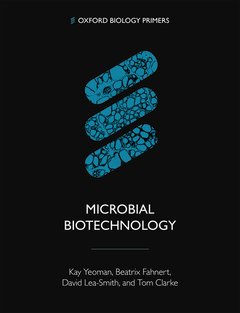Description
Microbial Biotechnology
Oxford Biology Primers Series
Authors: Yeoman Kay, Fahnert Beatrix, Lea-Smith David, Clarke Tom
Language: English
Subjects for Microbial Biotechnology:
32.87 €
In Print (Delivery period: 21 days).
Add to cart
Publication date: 12-2020
288 p. · 19x25 cm · Paperback
288 p. · 19x25 cm · Paperback
Description
/li>Biography
/li>
Written primarily for students embarking on an undergraduate bioscience degree, this primer will introduce students to topics at the forefront of the subject that are being applied to probe biological problems, or to address the most pressing issues facing society. These topics will include those that form the cornerstone of contemporary research, helping students to make the transition to active researcher. Students will acquire a solid understanding of the essentials of microbial biotechnology, its applications in agriculture, diagnostics and urban and artistic conservation, as well as the potential threats genetic modification may pose to public health, the environment and intellectual property.
Professor Kay Yeoman teaches microbiology in the School of Biological Sciences at UEA. She has undertaken research in the use of agricultural waste materials in fermentation media. She has also conducted research in the Rhizobium:legume symbiosis, investigating the uptake of iron. She is keen communicator of science, leads fungal forays and is particularly interested in fungi and their use in industry. Dr Beatrix Fahnert is a microbiologist with a background in medical, industrial and applied microbiology. She has been teaching related subjects at Undergraduate and Postgraduate level for more than 20 years, and is currently an Associate Professor at the School of Life Sciences, University of Lincoln. Beatrix is a member of the European Federation of Biotechnology and the UK Microbiology Society, where she served as Chair-Elect of the Education Division. Dr David Lea-Smith is a lecturer in microbiology at the University of East Anglia. His research is primarily focused on investigating photosynthetic cyanobacteria, specifically understanding their biochemistry and physiology, impact on the environment and potential for biotechnology as a platform for renewable production of industrial and medical compounds. Dr Tom Clarke graduated from UCL in Biochemistry and undertook a PhD at the John Innes centre in Norwich. After a research fellowship at the University of Michigan he joined UEA biological sciences in 2003. His current research involves uncovering how bacteria generate electricity in different environments.
© 2024 LAVOISIER S.A.S.
These books may interest you

Mammalian Synthetic Biology 32.87 €



